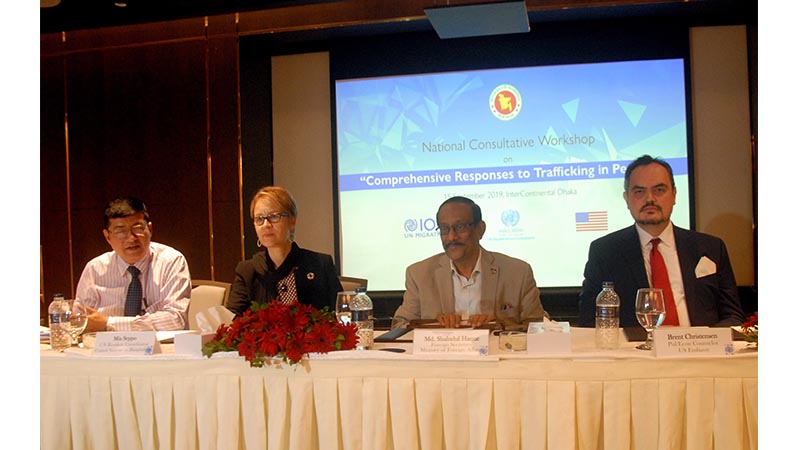Comprehensive plan to prevent human trafficking


In a bid to prevent human trafficking the government has taken a comprehensive national programme. Aiming to educate and support vulnerable groups who are common prey to the illegal acts, a ‘National Plan of Action for Prevention and Suppression of Human Trafficking 2018-22’ has been undertaken.
This will have multiple projects focused on improving economic and social conditions of vulnerable groups and building capacity of the administrations. As part of the prevention of human trafficking, the government would also strengthen implementing the sustainable development goals (SDG) of the United Nations for overall development of the vulnerable group of people or victims.
The projects include raising massive awareness programmes especially across the border districts where the vulnerable group of people live and fall easy prey to human trafficking. The programmes are aimed at raising and strengthening capacities of the concerned government institutions and increase sources to fight human trafficking. It is estimated that more than two lakh, mostly women and adolescent girls, are trafficked every year across the border for huge illegal earnings.
The Ministries of Home Affairs, Foreign Affairs and Expatriates' Welfare and Overseas Employment would be the focal agencies implementing the projects and coordinating with allied foreign and local authorities in preventing the trafficking. Some of the projects which would play key roles in reducing the illegal practices are; ‘advocacy and communication for children and women’, strengthening the motivational and publicity programme for the development of rural people, protection and support for early child development,’ rehabilitation of drug carrying and addicted children, strengthening of border security by procuring modern equipment and empowerment of women and girls through capacity building to prevent gender-based violence.
Considering its significance, a day-long workshop was organized at a city hotel on Sunday where dignitaries from the government and development partners addressed. “It is important to implement the 2012 law on prevention of human trafficking. There are many aspects in the law that empowers security forces to arrest and punish criminals,” said AKM Masud Ali, Executive Director of INCIDIN, a leading organization working on prevention of human trafficking.
Speaking on the occasion another participant said, “Trafficking is a crime which should be brought under control with the comprehensive efforts of government at all levels, development partners, law enforcement, civil society, the private sector, and other relevant actors. The workshop titled, “Comprehensive Responses to Trafficking in Persons” was organized by IOM Bangladesh as a coordinator and secretariat of UN Migration Network.
The workshop was also organized in coordination with Ministry of Foreign Affairs (MoFA) and Ministry of Home Affairs (MoHA) with financial support from US Department of State, Bureau of International Narcotics. Citing the US State Department’s Trafficking in Persons (TIP) Report 2019, the experts said many Bangladeshis who migrate every year through irregular channels risk exploitation and abuse at the hands of smugglers and traffickers.
TIP Report has put Bangladesh on Tier 2 Watch List for the third consecutive year in the wake of the government not meeting the minimum standards of trafficking elimination. This is an alarming state for Bangladesh and more needs to be done by all relevant stakeholders in the migration cycle, the experts said.
Brent Christensen, Political and Economic Counselor, US Embassy in Bangladesh said they view trafficking in person as a serious crime. “Bangladesh was ranked Tire 2 Watch list causing concerns for many people in this room,” he said. Brent Christensen said the report’s most critical recommendation advices Bangladesh to ‘significantly increase prosecutions and convictions for trafficking offenses.
“We believe Bangladesh has a constructive action plan to prevent human trafficking. The focus now must be implementation,” he said. Mia Seppo, UN Resident Coordinator in Bangladesh, said, “Trafficking disproportionately affect people who are already discriminated against and vulnerable to exploitation and exclusion.”
“The main challenges revolve around coordination, capacity, resources and data,” he said. He said that the efforts to prevent trafficking in persons require creative and coordinated responses. “Trafficking is also a development issue. State must also do more to support the victims and survivors of trafficking,” Mia Seppo said.
She added vulnerable people become targets of human traffickers for different reasons, including sexual exploitation, forced labor, transactional marriages, child labor exploitation, trafficking in street children and trafficking for the purpose of organ trade. “In some cases, migrant workers become Victims of Trafficking (VoTs) due to abuse and exploitation and to unethical recruitment practices by private recruiters and employers,” she said.
Md Shahidul Haque, Secretary, Ministry of Foreign Affairs, said that the mode of trafficking is changing rapidly. “If you want to fight human trafficking using outdated technology, you would fail. There is a huge gap between actions and trafficking business,” he said. The foreign secretary termed the trafficking a complex issue, saying trafficking should be brought under the umbrella of migration.
“You can’t talk about migration, unless you talk about trafficking. We want to reduce vulnerabilities and we have taken lot of initiatives. Recently, the Govt has decided to ratify Palermo Protocol to prevent and protect trafficking in person,” Shahidul Haque said. Girogi Gigauri, Chief of Mission, IOM Bangladesh, said, “Lack of job opportunities, poor awareness on safe migration, high costs of migration are some of the pull factors to irregular migration.
“As a coordinator of UN Migration Network, we are prioritizing the rights and wellbeing of migrants and their communities of destination, origin, and transit. And, we are always with the government to end human trafficking,” he said. Girogi Gigauri said the Government of Bangladesh has taken several initiatives to curb trafficking in Bangladesh.
“It demonstrated significant efforts by finalizing and adopting implementing rules for the 2012 Prevention and Suppression of Human Trafficking Act (PSHTA) in January 2017, and by drafting an implementation roadmap for the 2018-2022 National Action Plan (NPA),” he said.


